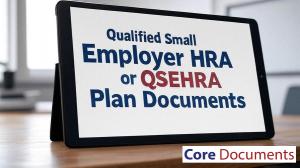Small Businesses Gain Flexibility and Tax Advantages with QSEHRA, Enabling Special Enrollment Periods and Supporting Employee Healthcare Needs
The QSEHRA offers employers a cost-effective way to provide meaningful health benefits without the burden of group plans, while employees gain the flexibility to choose coverage that fits their needs.”
— Gene C. Ennis - Core Documents
BRADENTON, FL, UNITED STATES, August 8, 2025 /EINPresswire.com/ -- Core Documents, a leader in providing compliance solutions for small businesses, is excited to spotlight the Qualified Small Employer Health Reimbursement Arrangement (QSEHRA) as a transformative health benefit option for
small employers and their employees. Introduced under the 21st Century Cures Act in 2017, QSEHRA offers a cost-effective, flexible alternative to traditional group health plans, empowering businesses with fewer than 50 full-time equivalent (FTE) employees to support their workforce’s healthcare needs while unlocking significant tax advantages.How QSEHRA Benefits Employers and Employees
QSEHRA allows small employers to reimburse employees tax-free for individual health insurance premiums and qualified medical expenses, providing a budget-friendly alternative to costly group health plans. For employers, QSEHRA eliminates the complexity of managing group coverage, offering full control over contribution amounts up to IRS-defined limits. These reimbursements are tax-deductible, reducing payroll and income tax burdens. Employers can also choose whether unused funds roll over, enhancing financial flexibility.
Employees benefit from the freedom to select individual health plans that best suit their needs, purchased on or off the Health Insurance Marketplace. Reimbursements are tax-free, provided employees maintain Minimum Essential Coverage (MEC), such as Marketplace plans, Medicare, or coverage through a spouse’s plan. This flexibility ensures employees can tailor their healthcare to their unique circumstances, from premiums to out-of-pocket costs like copays and deductibles.
Special Enrollment Period (SEP) Advantage
A key feature of QSEHRA is its ability to trigger a Special Enrollment Period (SEP) for employees. When a small employer offers a QSEHRA for the first time, or when employees become newly eligible, they qualify for a 60-day window to enroll in or change individual health insurance plans outside the annual Open Enrollment period. This SEP, established in 2020, ensures employees can quickly secure qualifying coverage to take full advantage of their QSEHRA benefits, enhancing accessibility and convenience.
2025 Contribution Limits
For the 2025 tax year, the IRS has set the following maximum annual reimbursement limits for QSEHRAs:
- Individual Coverage: Up to $6,350 annually ($529.16 per month)
- Family Coverage: Up to $12,800 annually ($1,066.66 per month)
These amounts, adjusted annually for inflation, represent an increase from 2024 limits of $6,150 for individuals and $12,450 for families. Employers can set contributions below these caps, and for employees eligible mid-year, limits are prorated based on months of eligibility.
Eligibility and Rules
To offer a QSEHRA, employers must meet specific criteria:
- Group Size: The employer must have fewer than 50 FTE employees and cannot be classified as an Applicable Large Employer (ALE) under the Affordable Care Act (ACA).
- No Group Health Plans: Employers cannot offer a QSEHRA alongside any group health plan, including dental, vision, or flexible spending accounts (FSAs). However, QSEHRAs can be paired with Health Savings Accounts (HSAs) if employees are enrolled in a High Deductible Health Plan (HDHP).
- Same Terms Requirement: QSEHRAs must be offered on the same terms to all eligible employees, though reimbursement amounts may vary based on age or family status (e.g., single vs. family coverage). Part-time, seasonal, or employees under 25 may be excluded at the employer’s discretion, but all full-time employees must be included.
Minimum Essential Coverage (MEC) Requirement
Employees must maintain MEC, as defined by the ACA, to receive tax-free reimbursements. MEC includes Marketplace plans, Medicare, Medicaid, and most employer-sponsored major medical plans. Employees must provide proof of MEC and substantiate expenses with documentation, such as receipts or insurance statements, to qualify for reimbursement. This ensures compliance with IRS regulations and maintains the tax-advantaged status of QSEHRA funds.
Compliance and Administration with Core Documents
Core Documents simplifies QSEHRA setup and administration, ensuring compliance with IRS regulations. Employers must provide written notice to eligible employees 90 days before the plan year or upon eligibility, detailing the reimbursement amount and tax implications if MEC is not maintained. Failure to provide notice may result in a $50 per-employee penalty, up to $2,500 annually. Core Documents offers expertly crafted plan documents and optional administrative support to streamline this process, helping employers avoid penalties and employees maximize benefits.
Why Choose QSEHRA in 2025?
“QSEHRA is a win-win for small businesses and their employees,” said Gene C. Ennis, President at Core Documents. “It offers employers a cost-effective way to provide meaningful health benefits without the burden of group plans, while employees gain the flexibility to choose coverage that fits their needs. The added benefit of a Special Enrollment Period makes it easier than ever for employees to secure qualifying plans and start using their QSEHRA funds.”
For small businesses looking to attract and retain talent while managing healthcare costs, QSEHRA is an ideal solution. Core Documents is committed to guiding employers through every step, from plan design to compliance, ensuring a seamless experience.
About Core Documents
Core Documents has been a trusted provider of IRS-compliant employee benefit plan documents for over 27 years. Specializing in Section 125 Cafeteria Plans, Premium Only Plans, Health FSAs, Dependent Care FSA, ICHRAs, QSEHRAs, EBHRAs, HRAs, Wrap SPDs, and Educational Assistance Plans. Core Documents helps employers nationwide maximize tax savings and compliance.




No comments:
Post a Comment